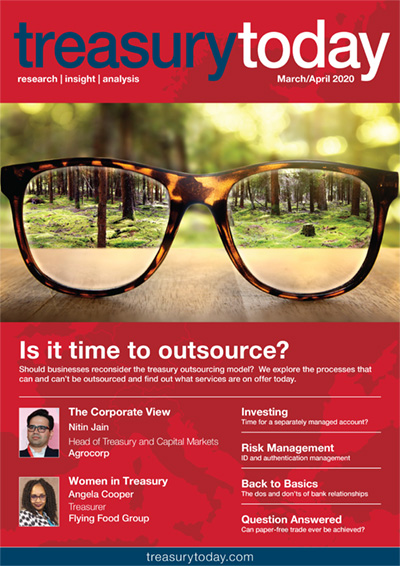Contents
- Editorial
- Testing times
- Insight & Analysis
- The return of treasury outsourcing?
- Webinar Report: Bottomline
- An easier path to digital treasury transformation
- Women in Treasury
- Women in Treasury: Angela Cooper, Flying Food Group
- Adam Smith Awards
- Collaboration deserves recognition
- The Corporate View
- Corporate View: Nitin Jain, Agrocorp
- Investing
- The role of SMAs in a low interest rate environment
- Smarter Treasury: HSBC
- 2020 vision: why banks are embracing change
- Risk Management
- Do I know you? Authentication and identification for treasurers
- Treasury Dialogues Series: Citi
- Just the ticket: Kenya Airways’ treasury on going digital
- Back to Basics
- The power of a good partner
- Question Answered
- Question Answered: Paper-free trade
- Market View
- Will investors continue to choose US over Europe?
Editorial
Testing times
Firstly, let’s tackle the Big One. Treasurers across the region will be keeping a close eye on the unfolding events following the outbreak of a novel coronavirus, Covid-19. Its economic impact is already being felt, with countries across the globe downgrading their economic growth forecasts. Supply chains are being disrupted, with factory closures in China affecting companies around the world, whilst diverse sectors are seeing a considerable impact, and many businesses take steps to minimise staff travel.
As they navigate these uncharted waters, treasurers will be working to understand the impact of the outbreak on their own organisations, from supply chain interruptions to the implications for FX risk, liquidity management and cash flow. At the same time, they will of course continue to focus on their existing challenges and responsibilities.
These are challenging times and they demand a sympathetic and intelligent response from everyone. Treasurers are known for their creativity, and with Treasury Today’s annual Adam Smith Awards upon us once more (nominations opened on 31st January and close at midnight on 14th April), it seems fitting to look at one of Adam Smith’s core economic principles of international trade: that of ‘comparative advantage’.
In ‘The Wealth of Nations’, Adam Smith wrote: “If a foreign country can supply us with a commodity cheaper than we ourselves can make it, better buy it of them with some part of the produce of our own industry, employed in a way in which we have some advantage”.
At a corporate level, allowing external specialists to take on ‘production’ of the elements less well-served by internal resources enables internal skills to focus on what they do best, for the greater good. The notion of comparative advantage thus underpins the value of outsourcing.
Several years ago, treasury outsourcing to a specialist agency – often a dedicated part of a bank – achieved a reasonable level of popularity. In recent times this course of action seems to have been subdued, perhaps at the hands of increasing corporate appetite for centralisation and consolidation.
It’s perhaps worth recalling another pearl of wisdom from Adam Smith: “Never complain of that of which it is at all times in your power to rid yourself”.
With many treasury functions increasingly overstretched by an ever-expanding remit, escalating demands from senior management to ‘do more with less’, and even treasury’s own push for more strategic involvement, it may be time to reconsider outsourcing.
In this edition, we explore the pros and cons of treasury outsourcing. We look at possible drivers, the latest options, possible outcomes, and how to ensure every agreement continues to align with the strategic needs of the business.
Continuing on the theme of expert guidance from outside the business, we also look at the separately managed accounts (SMAs). With the challenging interest rate environment persisting, we ask if treasurers would be advantaged if, instead of investing in a pooled fund, they took the solo option. Offering flexibility, control and increased yield opportunities, these may be the answer for those seeking a more productive home for their cash.
With a nod to the all-important human element in treasury, we cast a ‘back to basics’ eye over the way bank relationships are managed, probing the most effective ways to handle one of treasury’s most important partners. We ponder too the issues affecting treasurers every time they set up a transaction – identification and authentication, asking how businesses can be kept safe from skilled financial fraudsters.


